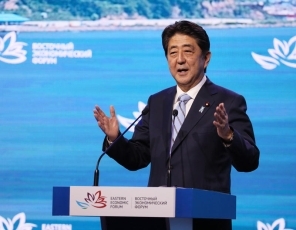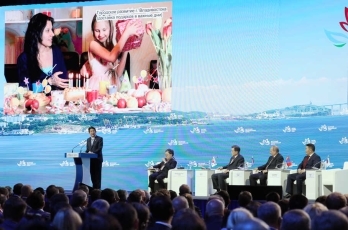Japan-Russia Relations
Address by Prime Minister Shinzo Abe at the 3rd Eastern Economic Forum
 (Photo: Cabinet Public Relations Office)
(Photo: Cabinet Public Relations Office)
 (Photo: Cabinet Public Relations Office)
(Photo: Cabinet Public Relations Office)
Mr. Ronnie Chan, thank you for your kind introduction.
President Putin, I have indeed returned to this Forum, just as I promised a year ago.
This Forum, held now for the third time, is becoming more and more substantive with each passing year. I congratulate you most sincerely for that.
And, President Moon Jae-in, President Khaltmaa Battulga, it is a great pleasure to see you here.
Ladies and gentlemen, as you are well aware, President Putin holds a black belt in judo.
As a matter of fact, President Battulga is also a judo black belt.
And, as far as I know, there is another judo black belt holder with us here at the Forum, Mr. Yasuhiro Yamashita, an Olympic gold medalist at the grade of 8th dan. Mr. Yamashita, are you here? I cannot help but make a proposal to you.
Mr. Yamashita, I wonder if we couldn’t bring these two black belt-holding presidents to Japan at the invitation of the All Japan Judo Federation. Then the three of you could show us your sparring.
Ladies and gentlemen, what do you think? Wouldn’t you like to watch these three sparring together?
As for me, I am not a black belt and I’m afraid of getting injured, so I think I’ll stick to watching you quietly from the gallery.
Now, this past December, President Putin came to my hometown of Nagato.
Nagato is a small city situated on the coast of the Sea of Japan. In the midst of frigid sleet, the people in my hometown nonetheless came out along the streets to welcome President Putin.
When dawn broke the following day, we found that the garden of the hotel was now nothing but white from one end to the other. In the middle of the night, the sleet had turned to snow.
“It’s stunning—a fairy tale world,” President Putin remarked.
A series of such scenes turned into unforgettable memories for the two of us.
Ladies and gentlemen, on that occasion President Putin and I spent five hours talking with each other and we resolved to fix our eyes not on the past, but solely on the future.
Japan-Russia relations are a fertile plain of possibility that emerges once we set that potential free. Aspiring to that, we made up our minds to decide what we should do here in the present.
On that occasion, the curtains opened on a new era in the history of Japan-Russia relations. That impetus provided momentum and is giving rise to new developments one after the other.
As I was preparing to give you an overview of these today, some very good news came my way.
I want you to share in my excitement as I tell you that Japan’s “Samurai Blue” has qualified for 2018 FIFA World Cup Russia!
A great many young people will be coming to Russia from Japan.
Young Russians and Japanese supporting each other and cheering each other on in the stadium—I can see that scene in my mind’s eye.
President Putin, our objective is certainly crystal clear.
We must continue our sincere efforts in the present for the sake of the young people alive today, precisely for the sake of their future.
Last year the Government of Japan made a proposal for it to select eight fields in which Japan’s private-sector entities can really shine and then bring about results in cooperation with the Russian side.
In order to foster mutual trust, the best way is to grind at the wheel together and then share in the success that follows. We chose fields and projects that would benefit both sides.
What we chose were fields directly connected with the daily lives of individual citizens living in Russia. We want to foster at the level of the average citizen the self-confidence that says we can achieve a vast many things if we work together.
That is what President Putin and I desired to do.
The first field we proposed was improvements to medical care, along with extending healthy life expectancies. I will refer to these slides.
There is a doctor at Japan’s Oita University who successfully conducted stomach cancer surgery using only endoscopy, the first surgeon anywhere in the world to do so.
Cooperation with Pirogov Russian National Research Medical University in Moscow, centered on that same Oita University, has borne fruit.
And then there is tuberculosis. I understand that more than 15 thousand Russians die of multi-drug resistant tuberculosis annually.
A new drug by a certain Japanese company is effective on tubercle bacilli that are resistant to existing drugs.
I would like to share with you the news that this past June, that drug company, named Otsuka Pharmaceutical, concluded a contract with the Russian company R-Pharm. In the fight against tuberculosis, Japan and Russia have joined hands.
Look at the Kulakov Research Center for Obstetrics, Gynecology and Perinatology in Moscow and the Russian Gerontology Clinical Research Center, affiliated with the federal government.
Look too at the Dmitry Rogachev National Research Center of Pediatrics, where my wife Akie visited this past April.
We will share our knowledge at hospitals serving as bases taking on medical care for infants and the elderly. Japan-Russia cooperation will gain ground, saving young lives and extending healthy life expectancies.
The second field we proposed was cooperation to develop cities that are easy to live in.
A year ago I made a request of President Putin here at this Forum.
It was about Vladivostok, a city brimming with unlimited development potential as a city for tourism and a center for transportation and commerce.
I asked President Putin for Japan to be added to the efforts to make the potential of this great city, a city both beautiful and nostalgia-inducing, blossom fully.
And then a year later, a blueprint has already been made.
Down by the waterfront, businesses and resorts will be integrated and spaces for recreation and relaxation will take shape.
We will polish up the beauty of its historic cityscape.
What you can see now on the screen is a plan to improve postal services through our bilateral cooperation. Packages will be delivered on time, on the day of your choosing. Through this service, sweet little girls like her will smile tremendous smiles on their birthdays.
This is also a vision to make Vladivostok a model city within the Far East for waste management.
Changing the scene now, let us look at Voronezh.
Needless to say, it is a place of great importance for transportation.
My Cabinet includes a minister advancing economic cooperation with Russia in particular, Minister Hiroshige Seko. The other day, he paid a visit to Voronezh.
Minister Seko says, “Voronezh will be a model for Japan-Russia cooperation.”
The city boasts a number of grand churches and is dotted with parks. It is highly picturesque, to be sure.
But Voronezh, with its population of more than a million people, faces the headache of automobile traffic jams.
Let us introduce systems there in which traffic signals both upstream and downstream exchange information about traffic volume among themselves and alter the length of the green lights accordingly.
The system reduces traffic jams by keeping the traffic signal green until a cluster of cars can pass through comfortably. It can also curb the amount of exhaust gases released through stopping and starting.
Then there is the sewerage system, now in disrepair. These are difficult to put under construction in cities built long ago. With that in mind, let us instead use technologies that replace the old sewerage pipes with new ones without digging up the ground. The scenery will not suffer at all.
We also put together a plan to move forward with improving the railways and developing the area around the stations in a unified way. There is the train station and then a vibrant part of town. We will try new urban designs.
That’s right—this applies Russian knowledge to Japanese technologies. What both our countries’ governments are aiming at is to create a city about which Russian citizens can each be proud, both internationally and heading towards the future.
At the same time, a great number of people related to Japanese companies visited Ekaterinburg this past July.
At the industry trade fair INNOPROM, Japan became a partner country for the first time and President Putin also graciously visited. As many as 168 Japanese companies and organizations had exhibits, of which 108 were second-tier companies or small- or medium-sized enterprises. Wide-ranging interest is now surging up in Japan.
I am certain that a fund of roughly 1 billion U.S. dollars, created jointly by both our countries, will be helpful when Japanese and Russian businessmen want to launch something together.
President Putin and I are both working to advance the digitalization of the economy. Ladies and gentlemen, let me tell you that our two governments have now signed a memorandum of understanding – an MOU – on cooperation to develop the digital economy.
A tremendous number of efforts are already in motion for each and every one of the eight points – so many that if I were to list up the examples, I could go on all day. I, along with President Putin, can hardly mask my surprise at just how many have come about in only this one year.
At this very moment when we are working in this way to build a foundation for prosperity looking earnestly towards the future, North Korea has been challenging the international community, as a grave and imminent threat that is unprecedented.
On August 29, North Korea launched an intermediate-range ballistic missile, sending it right over Japan.
On September 3, North Korea conducted its sixth nuclear test at a location a mere 300 km from here in Vladivostok. The scale of the detonation markedly surpasses those in the past.
North Korea is escalating an overt challenge to the peace, prosperity, law, and order of the region, and indeed the entire world.
We must make North Korea immediately and fully comply with all relevant United Nations Security Council resolutions and abandon all its nuclear and ballistic missile programs in a complete, verifiable and irreversible manner.
Towards that end, the international community must unite in applying the greatest possible pressure on North Korea.
The peace and prosperity of Northeast Asia being threatened by North Korea cannot be tolerated.
Japan and Russia must deepen their trust even further and strengthen their relations in terms of both the economy and security, building a strong cornerstone of stability in Northeast Asia.
I also want to advance efforts to cultivate the rule of law in the maritime order through Japan-Russia cooperation. I intend to continue this tirelessly within our dialogues concerning security.
A number of things that we could not achieve between Japan and Russia over the past 70 years have come to be set in motion over this single year.
If we continue our steps forward for another year, and then another after that, what we will see before us will be a brilliant future in which Japan-Russia relations will have brought their latent potential fully into bloom.
That is precisely why we must put an end to the unnatural state of affairs of not having a peace treaty even now.
Vladimir, let the two of us fulfill that responsibility, shall we not?
Let us overcome all difficulties to leave to the young people of the next generation a world in which our two countries, Japan and Russia, bring that potential well into bloom.
I also appeal to all those in the audience here today. Why don’t we – Japanese and Russians – join hands and carve out a new era for Japan-Russia relations?
Thank you very much.

